Rabbi Menahem Shemtov is the chairman of the Rabbis Committee for Inter-Religious Dialogue formally on behalf of the United Nations, and is the coordinator of the ultra-Orthodox programme at the Citizens’ Accord Forum (CAF) – an Israeli organisation that promotes mutual responsibility, participation and equal opportunity among all citizens of Israel. Rebbetzin Shoshana, originally from Manchester, is the project coordinator of CAF’s ultra-Orthodox women’s group. Originally British, she has appeared at conferences, group meetings and been interviewed on Israel radio. They spoke to Fathom editor Alan Johnson on 23 August 2016.
Part 1: The Citizens’ Accord Forum
Alan Johnson: Please tell us something about the history, goals and activities of the CAF.
Rabbi Menahem Shemtov: CAF was established by Rabbi Michael Melchior and our goals are to promote mutual responsibility, participation and equal opportunity among all citizens of Israel. All our activities advance a shared society and a sustainable democracy in Israel. We involve minorities, focusing on the Arab community and the ultra-Orthodox community. Among our ongoing projects are school headmasters discussing ways to deal with problems in education, Rabbis and Imams working together on issues, from graves to holy places, and we also facilitate groups trying to establish codes for using public areas such as universities, hospitals and parks. Minorities must feel comfortable in public spaces. Some demographic studies tell us that ultra-Orthodox Jews and Muslims are already 50 per cent of Israel’s population, so this is about taking care of Israel’s future.
AJ: Shoshana, it sounds like you’ve brought a new dimension to CAF through your work with ultra-Orthodox and Arab women?
Rebbetzin Shoshana: I run a group of Haredi (ultra-Orthodox) ladies – the wives of the rabbis group, in conjunction with a group of social workers. We meet usually once a month, and exchange our feelings and problems. We sit together in a cafe, equal numbers of Arab women and Jewish women. People stare in from the street and wonder what are those people doing together? By sitting together we have already made a statement and that is our aim; to show that we love each other, we care for each other, and we try to help each other by working out our problems together. It is very interesting to see how even though we are in such different worlds in the same little Israel, so many of our problems are so similar.
AJ: Such as?
Rebbetzin Shoshana: Well, right now we are discussing the obstacles that we are facing with teenagers and the next generation. We believe that there is a way to work through these problems and to get to a better point together. We also discuss discipline in schools and the connected issue of the use of modern technology. These are very big issues in both communities. These days, children are sitting on a Gameboy, watching television, and that is not the traditional Haredi way of the home. The Arab women also said one of their main problems is that their children are on Facebook and their mobile phones all day.
Part 2: The ultra-Orthodox and Israeli Society
AJ: There seems to be some contradictory trends going on in the ultra-Orthodox community. On the one hand, we read about demonstrations against army service and the repeal of those laws passed by Yesh Atid that aimed to increase ultra-Orthodox integration and burden-sharing (the ‘Sharing the Burden’ law was passed by the Knesset on 12 March 2014). On the other hand we hear that the ultra-Orthodox are joining the army and getting jobs in greater numbers, and embracing some aspects of technology. From the outside these seem to be contradictory trends. How would you sum up what’s happening?
Rabbi Menahem Shemtov: I was involved in establishing the Nahal Haredi battalion (Haredi Unit in IDF, official name Netzah Yehuda), which we started together 19 years ago. We picked up boys who were on the streets all day and we went to the rabbis and explained that these boys aren’t going to have any future if they stay on the streets – they should go to army. We were lucky to have met one of the top guys in the army then, General Yehuda Duvdevani (then the head of the Defence Ministry’s Department of Youth Activities and National Vision), and we slowly built the Nahal Haredi battalion. Undoubtedly, this was a great success for Israel.
I must be very clear on something. I am ultra-Orthodox and grew up in Herzliya; Shoshana grew up in Manchester. We feel that Haredi and non-Haredi Jews in London can walk together in the streets, and for the rest of the world we all just look like Jews. However, sometimes in Israel when you turn on the radio and listen to the news, you hear people speak about the Haredis as a threat: you do not work, you’re not in the IDF, you don’t take care of the security of the nation, and you have so many children, and so on. But any economics professor can tell you that a bigger population moves the circle of the economy.
The numbers of the Nahal Haredi will grow – every year more ultra-Orthodox volunteer to join the IDF. The numbers were growing, but as soon as it became a political issue, with the Yesh Atid legislation, we saw fewer Haredi teenagers joining. You see what happens is that when this issue is taken out of a political frame, people think, ‘well, I don’t want to simply sit here, I will volunteer to join the army’. But when people feel a threat, then participation in the army becomes just another fight amongst the politicians. I must say that this year these numbers have bounced back. I do not know whether this is because Yesh Atid is not in the government.
Real change takes years to happen, but the pace of change would increase if the army showed more respect for the needs of the ultra-Orthodox, in terms of food, their beliefs and prayer. We recently heard that some Haredi soldiers were told to cut off their beards. This we could never agree to. Even a liberal person like me could never agree to that. I’m not going to send my son to army if they want to change him into a different person. I want him to go in Haredi, and come out Haredi. But if the army is seeking to make all Israelis the same, then this will not work for us. Is Israel going to be a state with a cocktail of minorities and majorities living together, all equal, everyone keeping their own identity, or does Israel want to patronise us and tell us what to do, what to say, how to look, how to shave, and what to eat?
Look at the ultra-Orthodox in England and you see that the majority are working. You see Haredim wearing uniforms with their Tzitzit (traditional tassels worn by Jewish males) and beard, but working nonetheless. If you go to Brooklyn, you see a lorry driver or a bus driver with a beard and payot (traditional Haredi side-locks). Why is this not the case in Israel? There is one clear answer: in Israel the government has created a sort of ghetto. If you are Haredi, and you don’t join the army, then you are a soldier until you are sixty five. This means that the day that you want to go to work, you come through the army, complete your duty, and then you can go to work. If tomorrow the State of Israel changed this policy, and respected our views to keep our Judaism in the way we want it, and not in the way that we are told to keep it – things would be very different. I believe that in five years you’ll see the same amount of ultra-Orthodox going to work and taking an active share in the Israeli economy as in the US and the UK. But we need a change in the way people think about the ultra-Orthodox.
AJ: What do you mean?
Rabbi Menahem Shemtov: For example, Adina Bar-Shalom, the daughter of Ovadia Yosef (Iraqi-born Talmudic scholar, founder of Israel’s ultra-orthodox Shas party), opened a beautiful university for Haredim. She’s a good friend of Shoshana. But there is a dilemma. She has thousands of students – lawyers, accountants, social workers – but nobody will hire them, so they are unemployed. We have an organisation called Kamatech that facilitates the integration of Haredim into the Israeli hi-tech workforce. But how many companies in Israel hire ultra-Orthodox people? They could be geniuses in IT, but somewhere along the way there is a block. This is one of our main objectives: to break this block.
When Israel was established in the vision of the Zionist movement, it was to bring together Jews from around the world and mould them into one prototype of a Jew. This might have been a fantastic dream, but I think this is what is causing the chaos we are experiencing now. People didn’t dream that there would be Haredim, Muslims, and national Zionists living in one state. If we could change this flawed attitude and decide to respect everyone’s different ways of life in Israel, I’m sure we would all have a better future together.
We have entered a new phase in the future of Israel. For secular Jews in Israel, the parents’ dream is for their son to build a start-up company, and the next dream is to… leave Israel! He is not planning to employ as many Israelis as possible in his company. His dream is to sell it to a big company from the Far East or America, so that he can make his money and leave to go and live somewhere else, maybe in Silicon Valley.
We now know that the future of Israel is the ultra-Orthodox population. We are going to be a majority twenty years from now. Out of responsibility, we need to take care of the future of the State of Israel. We must ensure everyone feels comfortable living here. At present, at certain points, we feel uncomfortable. If we go to court, the rabbis often tell Haredim to take off their kippah (a skullcap worn by Orthodox male Jews) because we know by statistics that if you have a Haredi look, then there is no mercy for you.
Part 3: Education and employment
AJ: On the other hand, someone might say, why are some ultra-Orthodox pushing for changes to the law so that some ultra-Orthodox schools don’t need to teach the basic subjects to their pupils as a condition for getting state money? Isn’t that a backward step?
Rabbi Menahem Shemtov: This is coming from minorities within the ultra-Orthodox community who don’t want the State of Israel’s money. So, this policy is not a threat for them. Look, all of the Haredi girls in Israel are studying for the Bagrut (the Israeli version of A-Levels). With the boys, in 83 per cent of schools they’re studying exactly the same. We have only small numbers who are anti-Zionistic. Nonetheless, the real majority here don’t want to waste their time studying things they aren’t going to use.
We don’t always have a platform to explain why we wear a kippah, why we wear Tzitzit, why we keep kosher. But this is what the Jews did for the last two to three thousand years, whether we were living in Baghdad or Russia. If there are some Jews that want to live differently to us, then that is okay, but we are keeping to our own world, as we know it. This is what keeps Jews Jewish. I have nothing against others who live in a world different to ours.
Part 4: Peace and Inter-Faith
AJ: President Reuven Rivlin has talked about the ‘four tribes of Israel’ and a danger of Israel splitting into ultra-Orthodox, national religious, secular, and Arab. Do you share this concern? How can the separateness needed to respect cultural difference be prevented from developing into conflict?
Rebbetzin Shoshana: When I grew up in Manchester, my father set up a school for us to have Jewish education, as we were a real minority there. The Christians, Jews and Muslims all lived happily together. I never saw these divisions until I went to live in Israel. It saddens me to say that, and it hurts me to see my children notice this split. Even within the Jewish religion there are these divides between the different types of Jewish people. When I grew up in Manchester we were all equal, we respected each other. We are all people; the importance of respect lies at the core to my beliefs. I can think differently to you and disagree with you, but I will always respect you. I’m not quite sure where this respect has disappeared to over the years.
AJ: I know you’re both involved in inter-faith work. For those of our listeners who might not know what the term ‘inter-faith’ actually means, can you clarify that? It’s not always about discussing religious texts, right? It is more practical and in many ways much harder work than that.
Rabbi Menahem Shemtov: We might discuss religious texts, but it is certainly not confined to that. Inter-faith for us means putting everybody around a table and deciding how we should act in universities, hospitals and parks. What should the language be on the signposts in Israel? Is it going to be in Hebrew, English or Arabic? What we can do for the future generations? We might discuss the common challenge of technology. It has made everything about ‘the self’. Nowadays people simply have Facebook friends, and this is enough for them. Previously when people lived in communities, you needed a minyan (a minimum of 10 Jewish adult males required by Jewish law to be present to conduct a communal religious prayer service) for prayers three times a day. On Shabbat, you also need a community around you. So, you see our way of understanding the community is different. Children have access to anything online, and this is dangerous. We need to then find a way to guide children and teenagers to find beautiful things within technology, and not just the threats that we see. We need to find a way to deal with these things, without simply just saying no.
AJ: Please tell me about your work with Israeli Muslims.
Rebbetzin Shoshana: It’s very interesting to see each other’s different ways. And we need to respect our different ways. We had a meeting recently in which the Muslim women felt they didn’t have enough power. We Haredi women were absolutely gobsmacked. Because in our society, we’re not looking to be the prime minister or the mayor of the city; our place is more in the home, we have a quiet way of life. It opened our eyes very much to hear that the Arab women wanted to have power over her husband, wanted to rule herself, to earn her own wage, and to buy what she wants, with her own money. Their lifestyle is very different, and their needs are very different. This is a modern problem. The Arab women want a sort of higher profile than the Haredi women. It’s very interesting to see each other’s different ways. But I repeat: we need to respect our different ways.
Part 5: The ultra-Orthodox and the future of Israel
AJ: The Haredi community is growing. Looking to the future, what changes lie ahead for you, and what new responsibilities?
Rebbetzin Shoshana: I also find it very fascinating, coming from outside Israel, to hear how people speak about the Haredim. If we are nothing, why are we talked about so much? We are a little people and yet we are perceived as a major social force. That’s because we are growing, and people know we are soon going to have a position.
Rabbi Menahem Shemtov: I believe that instead of dealing with domestic Haredi budgets and benefits, we will take the responsibility into our own hands for how we think the Israeli state should be run. In twenty or so years, Haredim and Muslims will make up the majority of Israel’s population. Who will then be the decision-makers, and more importantly, what will those decisions be? We will need doctors and pilots, so who will be the doctors and pilots? Who will take care of Israel’s economy?
We have groups of rabbis, academic people getting together to discuss how we view the economy in relation to the Halakhic (the collective body of Jewish religious laws derived from the Written and Oral Torah) way of the Jews. In a state, we have taxes, but how does this go together with Jewish laws, and who is going to take the decision of how we split it? What will the future of our children be? They would like to be lawyers, accountants, computer programmers, apps producers and designers. No doubt this is a big challenge.
We will prove we can take the responsibility of government. It is just a matter of Israel ceasing to try and change us, and to let it happen naturally. Haredi Yaakov Litzman (of the United Torah Judaism party) is the best and most popular Minister of Health we’ve ever had. Aryeh Deri (Shas party leader), Minister of Interior, is the most popular politician in the Muslim villages and the Arab cities in Israel. Deputy Minister of Finance, Yitzchak Cohen (also from Shas) has been doing a fantastic job for the last ten years.
It is easy for me predict say in the future the ultra-Orthodox Jews should play a larger role in the workforce. My parents are from Iraq, and most of the Jews in Iraq, even the ultra-Orthodox worked for a living, halachic as well as studying the Beit Ha-Midrash (place where the Jews gather to study and learn Torah). But those who came from Eastern Europe might not have the same mentality, so it is challenge for them. If you double click on the ultra-Orthodox community, you’ll see that there are so many varieties; each one has their own way.
AJ: If Israel is going to be shaped by an ultra-Orthodox, will it be improved?
Rebbetzin Shoshana: People will be equal, and will love and care for each other. There won’t be feelings of fear or pressure. It would certainly be a calmer society.
AJ: Rabbi Shemtov and Rebbetzin Shoshana, thank you both for sharing with us your insights. It has been a fascinating conversation and I am sure our readers will have learnt a great deal.

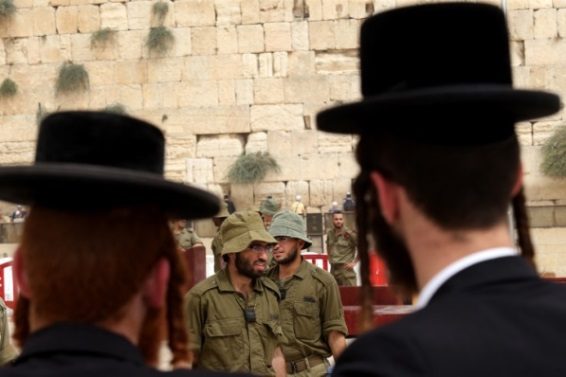
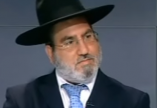

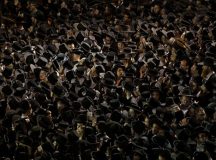
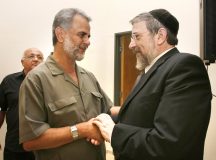
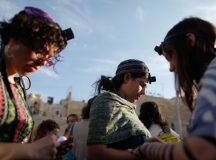































Comments are closed.